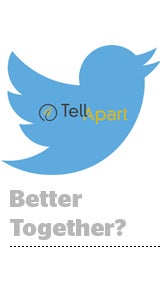 Twitter will pay $532.6 million – all in stock– to acquire digital ad platform TellApart, the company disclosed in an 8K filing with the Securities and Exchange Commission. It’s a large figure for an ad tech purchase, placing TellApart’s market cap above most public companies in the space and making it the spendiest merger deal Twitter has done yet.
Twitter will pay $532.6 million – all in stock– to acquire digital ad platform TellApart, the company disclosed in an 8K filing with the Securities and Exchange Commission. It’s a large figure for an ad tech purchase, placing TellApart’s market cap above most public companies in the space and making it the spendiest merger deal Twitter has done yet.
In its previous largest deal, Twitter plunked down about $350 million to scoop up MoPub. In two other notable marketing-related buys, it paid $100 million for TapCommerce and $80 million for Bluefin Labs. This deal was about equal to all three of those companies put together.
According to the SEC document, Twitter will issue 12.6 million shares of its stock to TellApart’s investors at Twitter’s $42.27 closing price as of April 28. However, the value paid may end up being lower than that, as the agreement stipulates the number of shares issued is tied to closing price over a period of time. Given the sharp drop in Twitter’s stock in the wake of its Q1 earnings calamity (its stock was trading at about $38.50 as of Thursday at 9am), it seems likely that the consideration paid to TellApart will be lower.
The deal values TellApart above many public advertising technology companies, including Rocket Fuel, Tremor Video and TubeMogul. Among public pure play ad tech stocks, only Rubicon ($668 million) and colossal Criteo ($2.6 billion) have higher valuations. And the price paid is about on par with the large video ad platform acquisitions in recent years, such as BrightRoll (for which Yahoo paid $640 million), LiveRail (Facebook paid about $500 million) and Adap.tv (AOL paid $405 million).
As a general rule, display ad tech (versus video) has been valued lower, although the acquisition of Conversant by Epsilon parent Alliance Data Systems for $2.3 billion was a notable recent exception.
TellApart’s financial data is not public, but industry investment sources have estimated its net revenue at $50 million to $100 million, and its gross revenue at $100 million to $200 million — meaning TellApart’s investors made a 5x-to-10x multiple on net revenue. The company has raised $17.8 million to date from investors including Greylock Partners and Bain Capital Ventures.
The high-flying exit will be seen as a positive sign by ad tech investors, at a time when many buy-side companies have struggled to achieve profitability, raise funds and sustain their valuations. This month, Turn dismissed its CEO and head of product amid concerns about profitability, and Rocket Fuel conducted a round of layoffs. (Update: Turn disputes this version of events, stating CEO Bill Demas left for personal reasons.)
Why was Twitter willing to pay so much? TellApart has a few things going for it, which may have influenced Twitter’s calculus. One is its strong customer penetration with large retailers, including Neiman Marcus, Sur la Table, Wayfair and Pottery Barn. Another is its support for complex use cases in the retail sector, which was cited by Facebook sources as a reason that TellApart continued to be listed as a Facebook Exchange partner when the FBX program was culled earlier this year.
A third opportunity exists around Twitter’s login data. TellApart’s technology could be combined with a cross-device ID solution based on Twitter’s direct relationships with its users, giving it a stronger story around mobile ad targeting.
Also, there is a talent opportunity. Twitter’s SEC filing references “continuing service obligations to the Company of certain security holders of TellApart.” With the ascension of previous ads product chief Kevin Weil to VP of product for all of Twitter, TellApart CEO Josh McFarland would appear well positioned for a senior leadership role in the company’s ad product division, where the company may be in need of a smartypants.
Updated at 11:05am EST to add Criteo reference and background details.










